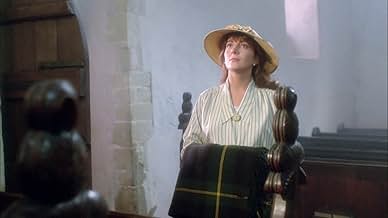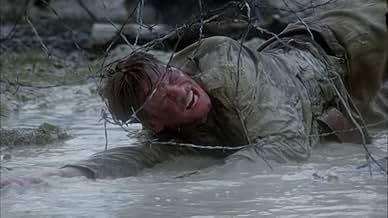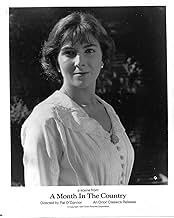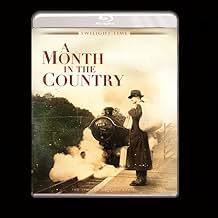AVALIAÇÃO DA IMDb
6,8/10
2,2 mil
SUA AVALIAÇÃO
Adicionar um enredo no seu idiomaTwo soldiers (Colin Firth, Kenneth Branagh) recover from World War I while spending a summer in a Yorkshire village.Two soldiers (Colin Firth, Kenneth Branagh) recover from World War I while spending a summer in a Yorkshire village.Two soldiers (Colin Firth, Kenneth Branagh) recover from World War I while spending a summer in a Yorkshire village.
- Prêmios
- 1 vitória e 1 indicação no total
Ken Kitson
- Mr. Sykes
- (as Kenneth Kitson)
- Direção
- Roteiristas
- Elenco e equipe completos
- Produção, bilheteria e muito mais no IMDbPro
Avaliações em destaque
This pastoral English period piece must be one of the quietest anti-war movies ever made, with a single gunshot heard throughout the entire film (except for the brief battleground flashback before the opening credits), and fired only by a sportsman. But its effect is no less traumatic on the shell-shocked protagonist: a veteran of The Great War taking refuge, after the Armistice, in an isolated English village, far away (except in his nightmares) from the trenches. Hired by the local church to excavate a medieval mural above the alter, he uncovers, in no particular order: an age-old mystery; a bittersweet attraction to the vicar's young wife; a kinship with another ex-soldier (Kenneth Branagh, pre-'Henry V') and, finally, some of the dignity he lost in battle. Don't expect any grand gestures from the leisurely told story. Any positive response to the film will depend entirely on a tolerance for such anachronistic virtues as forbearance, charity, and forgiveness.
It is a movie like a good book, you want to cozy down with on a long winters night....it said more than it showed and it showed more than it said..the parting of Birkin and Moon mostly, Birkin, had me watching it several times,,what were the questions and the answers?...it reminded me of "Waiting for the Moon" with Linda Hunt...thanks
This is a true gem of a film. Only those however who have an empathy for the destruction of World War One, and a sensitivity about how moving religious themes can be, will really appreciate the aspects of the film which make it timeless. It is deliberately slow and careful in its pace, and the contrasts between Church and Chapel, working and upper class, and social mobility makes it a film I have always found very moving. The use of the Schubert Mass as a musical backdrop at key points emphasises the cathartic journey Birkin makes. Indeed, his visit to the church as an old man demonstrates the way he has been cleansed of the mud of Flanders.
When an arm or leg is removed, the amputee can continue to 'feel' it for some time afterwards. The phantom limb can hurt, or itch, or feel cold. But nothing is truly the same.
Similarly, the First World War irrevocably altered Britain, but in its immediate aftermath we limped on, unaware (or unwilling to admit) that anything had changed. It's this brief period of denial that Month in the Country illustrates: the moment when we teetered on the edge of the 19th century before toppling into the 20th.
Consequently, while it is a film of great heartbreak and loss, it is also one of great hope and triumph of the human spirit. There is one scene that perfectly illustrates this: a little girl visits her friend, who is sick in bed. She talks about the weather and her new hat and how they'll play together when her friend gets well. Then as she walks back home she says to Colin Firth
'She knows she's dying, doesn't she?'
It is as tragic for the girl to be so knowing and capable in the face of death as it is for young men to have experienced the hell of the trenches and return to indifference and hostility. But because of that tragedy they will go on to experience a more real, and potentially more joyful world, than the other inhabitants of comfortable and conventional Oxgodby.
Similarly, the First World War irrevocably altered Britain, but in its immediate aftermath we limped on, unaware (or unwilling to admit) that anything had changed. It's this brief period of denial that Month in the Country illustrates: the moment when we teetered on the edge of the 19th century before toppling into the 20th.
Consequently, while it is a film of great heartbreak and loss, it is also one of great hope and triumph of the human spirit. There is one scene that perfectly illustrates this: a little girl visits her friend, who is sick in bed. She talks about the weather and her new hat and how they'll play together when her friend gets well. Then as she walks back home she says to Colin Firth
'She knows she's dying, doesn't she?'
It is as tragic for the girl to be so knowing and capable in the face of death as it is for young men to have experienced the hell of the trenches and return to indifference and hostility. But because of that tragedy they will go on to experience a more real, and potentially more joyful world, than the other inhabitants of comfortable and conventional Oxgodby.
I adored the book by J. L. Carr, and was skeptical that Birkin's first person narrative could be conveyed on film. Firth brilliantly makes this internal landscape manifest, while the film provides a sumptuous external setting. All the lead cast strike an effective balance between intensity and restraint. Every time I view the movie, I see things that I hadn't noticed before.
I wish I had seen "A Month in the Country" on the big screen when it was released. The laserdisc looks good, though I wonder what I'm missing. Even though the laserdisc soundtrack is monophonic, it was striking enough to make a friend jump when we were viewed it.
I wish I had seen "A Month in the Country" on the big screen when it was released. The laserdisc looks good, though I wonder what I'm missing. Even though the laserdisc soundtrack is monophonic, it was striking enough to make a friend jump when we were viewed it.
Você sabia?
- CuriosidadesFilm historian Nick Redman mentions in his commentary included in the BFI edition of the movie that, at the time of its original release, this was said to be a movie "starring two nobodies".
- Erros de gravaçãoAccording to Alice Keach, her roses are the variety Sarah Van Fleet. However, the film is set in 1920 and Sarah Van Fleet roses were not introduced until 1926.
- Citações
Reverend Keach: Mr. Birkin, you should know here and now that you employment here does not have my support. But as the solicitors refuse to pay out the £1,000 bequest to our fabric fund until your job is finished I have no choice.
Principais escolhas
Faça login para avaliar e ver a lista de recomendações personalizadas
- How long is A Month in the Country?Fornecido pela Alexa
Detalhes
Bilheteria
- Faturamento bruto nos EUA e Canadá
- US$ 443.524
Contribua para esta página
Sugerir uma alteração ou adicionar conteúdo ausente




















